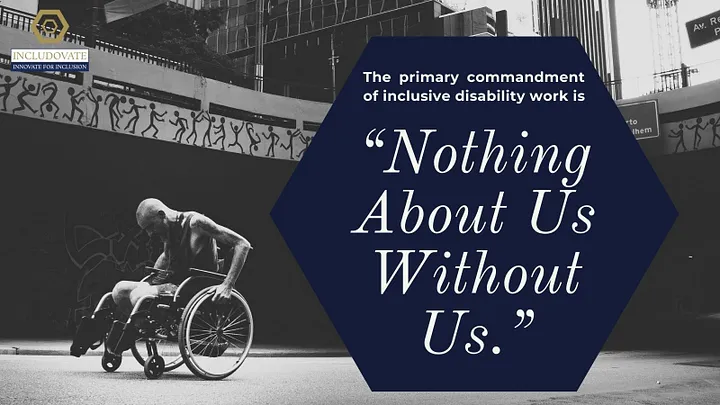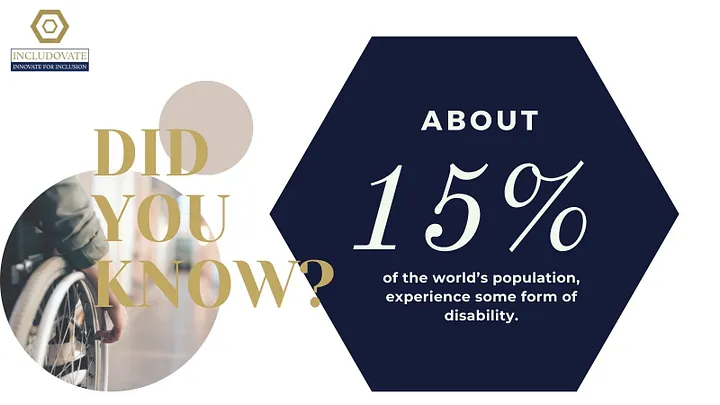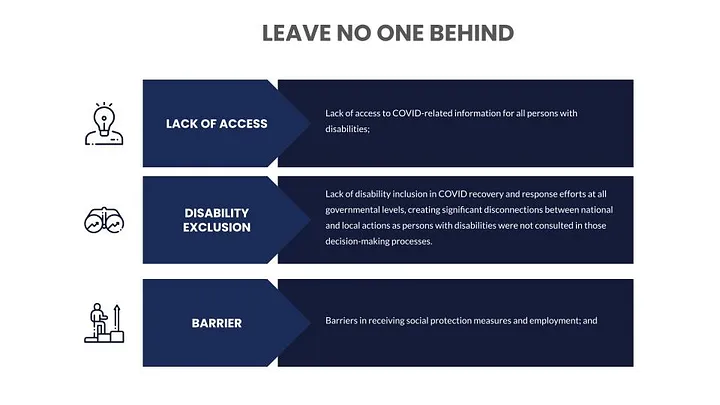By Priva
Disability Advocacy’s Impressive Strides Recent work in disability rights advocacy, including international development practice, has shown a significant commitment to disability-inclusive development. A major characteristic of the success of the Convention on the Rights of Persons with Disabilities (CRPD) is the principle embodied by the slogan “Nothing About Us Without Us.” It is this principle that guided the architects of the CRPD to engage with persons with disabilities and organisations of persons with disabilities (OPDs) to be integrally involved in the drafting of the CRPD. Over the years, working with organisational and individual partners immersed in disability work has caused many of us to realise that this and other precepts of the CRPD have been embraced and adopted more comprehensively than we previously thought. This progress, however, should not blind us to the challenges that remain in disability international development.

Great Success, Worrying Misconceptions
While there is so much good work that has arisen from bringing to life the provisions of the CRPD, there are many gaps with organisational and individual activists when it comes to the basic conceptualisation of why we pursue disability-inclusive development. While absolute perfectionism is not expected and, indeed, is unrealistic, some of these gaps are fundamentally dangerous. One such misconception is that the heart and soul of disability-inclusive development is for purposes of benefiting persons with disabilities. While it is true that persons with disabilities do benefit from an equitable society, suggesting that we design disability-inclusive development programmes for the sole purpose of benefitting persons with disabilities is problematic and worrying.
Good Allies, Wrong Motivations
The main problem the CRPD sought to cure was the long-standing notion that persons with disabilities needed sympathetic “redemption” from the rest of the world. Prior to the CRPD, global disability interventions relied on two (mis)conceptualisations: the medical model and the charity model. Although quite distinct from each other, the common denominator for the two models is that their proponents perceived persons with disabilities as needing “help,” either medical or in the form of charity. They did not see that it is social barriers that are disabling and inhibitive to 15 percent of the global population realising their full potential. According to the medical model, a disability is “a defect or sickness which must be cured through medical intervention” (Kaplan, 1999 in Stone-MacDonald and Butera, 2012: 62–77). Like the medical model, the charity model perceives disability as needing aiding. The charity model is conceptually driven by the understanding that disability is some form of lack (Haang’andu, 2019; Titchkosky, 2003). The premise for charity is pity that the other is unable to do certain things on their own due to a disability (Haang’andu, 2019).

The thought, therefore, that disability-inclusive development is for purposes of benefitting persons with disabilities, though it references the CRPD, falls squarely within these two models and is, thus, a misrepresentation of the CRPD. The problem with this conceptualisation of disability advocacy is that it reinforces persons with disabilities as “patients” and not agents, that they are helpless and the advocates are their rescuers. This messianism has no place in a human rights–based approach to inclusive development.
What, Therefore, is the Business of Disability-Inclusive Development?
The answer to this question is two-fold. Any disability-inclusive development programme that suggests otherwise is problematic.
There is a Right and Wrong
The first and most important justification for disability-inclusive development is that it is normatively the right thing to do. In its opening preamble sentence, the United Nations Universal Declaration of Human Rights guarantees all members of the human family inherent dignity and inalienable rights and it further argues that this is the basis for freedom, justice, and peace. By these standards, therefore, all human beings are equal, and states (and advocates) are directed to promote and protect human rights for all. Driven by this human rights outlook, which is foundational to “Nothing About Us Without Us” and the CRPD, disability-inclusive development seeks not to benefit persons with disabilities but to analyse inequalities which lie at the heart of development problems and redress discriminatory practices and unjust distributions of power that impede development progress for persons with disabilities.
Agency and Contribution to Social Well-being
The second reason for disability-inclusive development is utilitarian. All humans, as philosopher Martha Nussbaum (2006) argues, are agents and not patients. Like every other productive sector of society, persons with disabilities can nurture exceptional talent, as exemplified by Stephen Hawking, to take one example. According to the International Labor Organisation, it is estimated that the exclusion of people with disabilities costs up to 7% of a country’s GDP annually. Furthermore, a 2014 study by the International Centre for Evidence in Disability concluded that a country’s gross domestic production increases as more people with disabilities gain access to education and work (Banks & Polack, 2014).

Conclusion
The primary commandment of inclusive disability work is “Nothing About Us Without Us.” While this entails meaningful and non-tokenistic involvement of persons with disabilities in policy making and programme design, it does not amount to “helping” or producing “helpful” outcomes for persons with disabilities. The reason disability work ought to be consultative and involving of persons with disabilities is that they alone understand the true needs and policy interventions that address their lived experience. The cumulative outcome of this iterative policy process benefits society at large because it makes it equal by enhancing freedoms for all, facilitating participation of all, and producing optimal economic outcomes that benefit the whole society. Advocates must guard against the temptation to lapse into the innuendos of outdated charity and medical models and their associated implications. Donors must endeavor to build capacities in their in-country partners on the ground to ensure any resulting programmes and the language therein does not directly or indirectly reinforce the medical and charity models.
About the authors
Dr. Priva Hang’andu is Includovate’s Governance Principal Researcher. He has taught Political Science in Canada and in Zambia. His research interest is in the role of transnational policy actors in driving disability and gender policy change in Africa. He also researches democratisation and its pathways. Priva has published on disability, institutions, democratisation in Africa, and on social policy in internationally reputed academic journals. He has also worked in non-governmental organisations and consulted with international organisations such as the African Development Bank. Priva served for several years as the governance and political advisor at the United States Department of State.
Includovate is a feminist research incubator that “walks the talk”. Includovate is an Australian social enterprise consisting of a consulting firm and research incubator that designs solutions for gender equality and social inclusion. Its mission is to incubate transformative and inclusive solutions for measuring, studying, and changing discriminatory norms that lead to poverty, inequality, and injustice. To know more about us at Includovate, follow our social media: @includovate, LinkedIn, Facebook, Instagram.
References
Banks, L.M., & Polack, S. (2014). The economic costs of exclusion and gains of inclusion of people with disabilities: Evidence from low and middle income countries. CBM, International Centre for Evidence in Disability, and London School of Hygiene & Tropical Medicine.
Berman, G. (2008). Undertaking a human rights-based approach: A guide for basic programming — Documenting lessons learned for human rights-based programming: An Asia-Pacific perspective — Implications for policy, planning and programming. UNESCO Bangkok. 32 p. https://unesdoc.unesco.org/ark:/48223/pf0000179187.
Haang’andu, Privilege. (2019). Transnational actors and policy diffusion: Ideational pathways towards successful disability policy diffusion in Southern Africa [Doctoral dissertation, University of Saskatchewan]. HARVEST, University of Saskatchewan’s Research Archive. http://hdl.handle.net/10388/12346.
Nussbaum, M. (2006). Frontiers of justice: Disability, nationality, species membership. Belknap Press, Harvard University Press.
Stone-MacDonald, A, & Butera, G. (2012). Cultural beliefs and attitudes about disability in East Africa. Review of Disability Studies: An International Journal, 8(1), 62–77.
Titchkosky, T. (2003). Disability, Self, and Society. University of Toronto Press.
